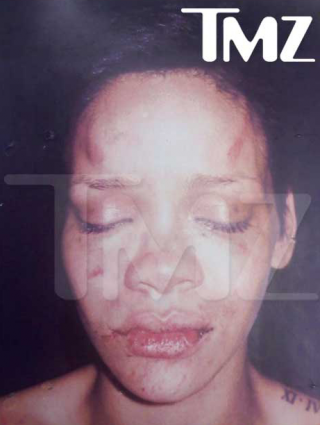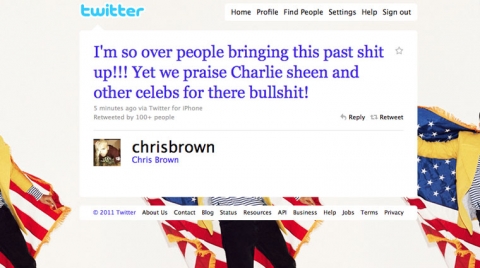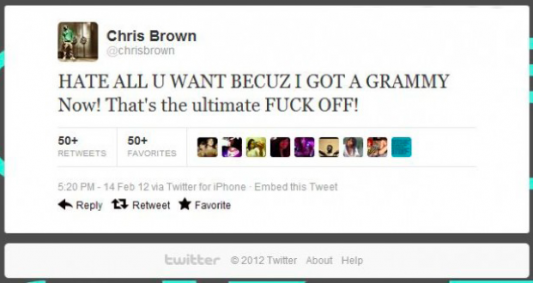Should You Quit Twitter To Repair A Bruised Image?
An incident involving a controversial performer earlier this week brought up a question I’ve been thinking about for a while: when should a public figure – a CEO, a sports star, or an entertainer – stop using Twitter?
Here’s the background: Chris Brown is a 22-year-old R&B singer who’s burned up the charts over the past few years with seven top ten hits. He’s a fabulously talented entertainer who dances as well as he sings.
Of course, there’s a good chance you know who Chris Brown is even if you’ve never heard his music. He’s the guy who badly beat up the singer Rihanna, then his girlfriend, in 2009. According to the police report:
“He took his right hand and shoved her head against the passenger window…[Rihanna] turned to face Brown and he punched her in the left eye with his right hand. He then drove away in the vehicle and continued to punch her in the face with his right hand while steering the vehicle with his left hand. The assault caused [Rihanna’s] mouth to fill with blood and blood to splatter all over her clothing and the interior of the vehicle.”
Here’s what Rihanna looked like after he was done with her:

Afterwards, Brown hired a crisis management firm, repeatedly apologized for his actions, and said, “Words cannot begin to express how sorry and saddened I am over what transpired.” His tour of contrition likely didn’t persuade too many people, but it at least appeared to be a step in the right direction.
Well, not quite. He was soon back to his old ways.
In December 2010, he sent out an anti-gay tweet that taunted a fellow musician who claims to have been molested by his manager.
In March 2011, after an interview with ABC’s Good Morning America, he damaged a window, angrily confronted ABC producers, and stormed away from the building shirtless after being asked about the incident. Afterwards, he tweeted:

Brown deleted that tweet shortly after sending it. So you would think he’d know to better than to tweet before thinking. But after winning his first Grammy Award last Sunday, he tweeted (and quickly deleted) this:
Chris Brown’s actions seem to confirm that he’s not particularly committed to reforming his behavior or doing what it takes to earn any form of public redemption. As the expression says, the best predictor of future behavior is past behavior, and Mr. Brown’s past suggests we can expect more negative headlines along the way (though hopefully not of the domestic abuse kind).
But this post is only nominally about Chris Brown. The bigger question is this: does there come a point at which a public figure must stop tweeting as a key component of reputation management?
In Chris Brown’s case, I’d submit that his refusal to quit Twitter – despite his track record of saying controversial things over the social network – confirms his lack of seriousness about personal rehabilitation. If he’s willing to give nothing up, the public can only conclude that he’s the same man that beat Rihanna three years ago.
On the other hand, consider Anthony Weiner. After being caught in a sexting scandal last June, Mr. Weiner – a serial tweeter – suddenly stopped. He hasn’t sent out a new tweet since June 1, 2011. And his Twitter silence seems to be a critical step toward an eventual image rehabilitation, since it demonstrates an actual sacrifice and change in behavior.
Same thing with singer John Mayer, who shuttered his Twitter account, along with its 3.7 million followers, shortly after telling Playboy that his penis discriminated against black women.
Same with Ashton Kutcher, who turned his Twitter account over to his management company after sending out a tweet that complained about Joe Paterno’s firing but said nothing of the victims.
In the final analysis, Twitter can be a great avenue for stars to communicate with their fans and enhance their personal brands. But when their communications go awry, quitting Twitter may be a critical step toward regaining their image.
If you like my blog, please stay in touch! Like us on Facebook here and follow us on Twitter here.




Brad, I think you’re right. Celebs and others should stop tweeting when they F* up. On the other hand, Conan O’Brian’s tweet stream is probably th best case study of a celeb using Twitter to enhance his reputation by doing what O’Brian does best — make people laugh.
Lest we confuse celeb damage control with crisis communication, when an organization goes into managing a crisis, tweeting, I think, is essntial. Yes?